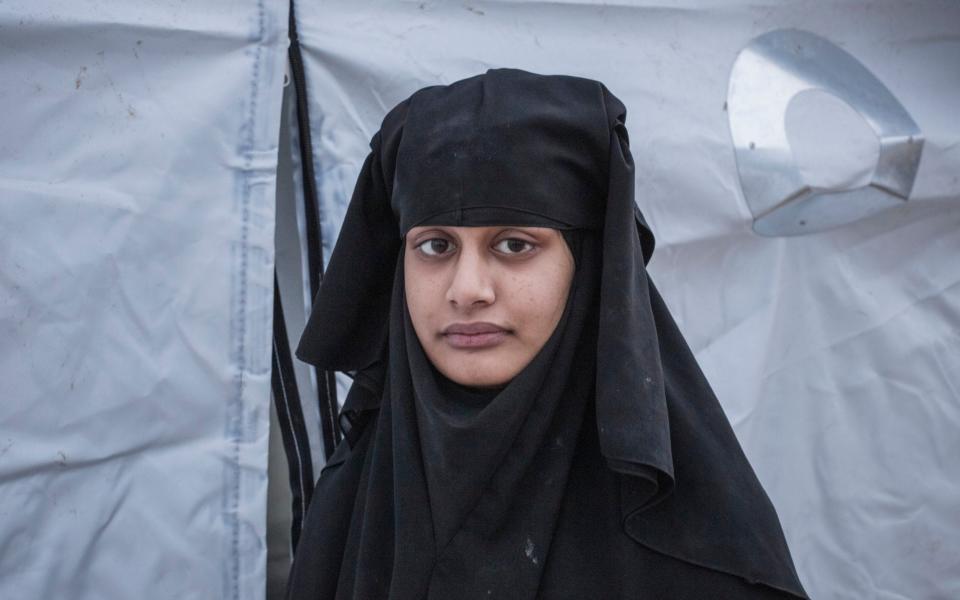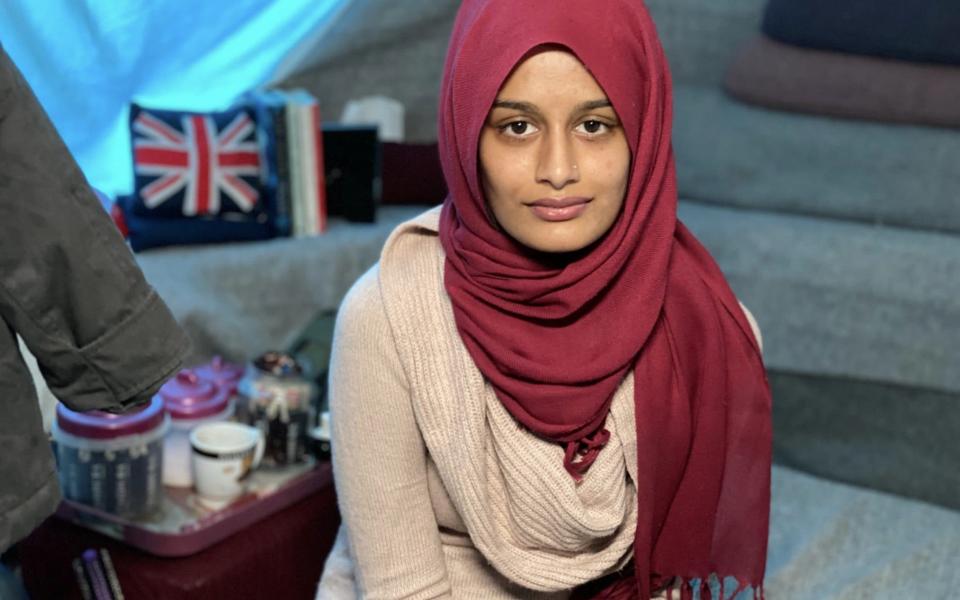Shamima Begum cannot return to UK to fight for citizenship, Supreme Court rules

Shamima Begum, the London schoolgirl who fled to join Isil, has lost her legal bid to return to the UK to appeal against the removal of her British citizenship.
The Supreme Court upheld a challenge against the Court of Appeal after it ruled last year the only way the jihadi bride could have a fair and effective appeal was if she was allowed to return to the UK.
Ms Begum and two of her school friends left their home in Bethnal Green in 2015 to travel to Syria, where they married jihadi fighters and lived under Isil rule.
She was found, heavily pregnant and mourning the loss of two children, in a foetid refugee camp in 2019 and had her passport revoked on national security grounds by Sajid Javid, then Home Secretary, setting in motion a series of legal battles in the UK courts.
The Special Immigration Appeals Commission (SIAC) initially upheld the Home Secretary’s decision, but in June 2020 the Court of Appeal ruled she had been denied a “fair and effective appeal” by her continued detention by the Syrian Democratic Forces.
The Home Office launched a challenge in the Supreme Court to block her return, arguing that it would expose the public to “an increased risk of terrorism”.

On Friday, Lord Reed, the president of the Supreme Court, upheld the challenge brought by the Home Office.
He said the Court of Appeal had not given the decision of the Home Secretary "the respect it should have received" as he been democratically given the responsibility to make national security assessments.
The lower court had “made its own assessment of the requirements of national security and preferred it to that of the Secretary of State, despite the absence of any relevant evidence before it”.
He continued: “The right to a fair hearing does not trump all other considerations, such as the safety of the public.
“If a vital public interest makes it impossible for a case to be fairly heard then the courts cannot ordinarily hear it.
“The appropriate response to the problem in the present case is for the deprivation hearing to be stayed – or postponed – until Ms Begum is in a position to play an effective part in it without the safety of the public being compromised.
“That is not a perfect solution, as it is not known how long it may be before that is possible.
“But there is no perfect solution to a dilemma of the present kind.”
Following the ruling, Mr Javid, who has since left government, released a statement welcoming the decision.
It said: “I strongly welcome the Supreme Court’s ruling on Shamima Begum. The Home Secretary is responsible for the security of our citizens and borders, and therefore should have the power to decide whether anyone posing a serious threat to that security can enter our country.
“There are no simple solutions to this situation but any restrictions of rights and freedoms faced by this individual are a direct consequence of the extreme actions that she and others have taken, in violation of government guidance and common morality.”

Last year, Sir James Eadie QC, for the Government, told a two-day hearing at the Supreme Court that Ms Begum was considered a “real and current threat to national security”.
MI5 was said to have advised Mr Javid in 2019 that Ms Begum was “aligned with Isil” and the risks she posed would be best tackled by depriving her of her citizenship.
Details were also disclosed to the court of an earlier assessment by the Security Service regarding the potential danger Britain faced from returning Isil supporters.
Quoting from a security document, Sir James said: “Individuals are likely to have obtained instructions and training in skills that will enable them to carry out terrorist attacks, including the use of firearms and other weapons."
The Home Office also sought to discredit the view that Ms Begum should be shown leniency because she was radicalised at a young age and has since renounced Isil.
Sir James said there had not been any public findings or allegations that Ms Begum was groomed or trafficked when she left to join the terror group in Syria.
“National security concerns are very real, very serious and not undermined a jot by the fact she went when she was very young," he told the court.
The attack on Fishmongers’ Hall which left two dead in November last year was held up as an example of how an apparently reformed extremist could inflict appalling harm.
Sir James said it would be “entirely wrong” to assume Ms Begum does not present any security risk - or even less of a risk - because some viewed her “as a victim”.
He said the “radicalisation and desensitisation” to violence that Ms Begum underwent in Syria - illustrated by her comments in an interview that the sight of severed heads “didn’t faze” her - meant she still presented a danger to the public.
She had similarly continued to live under Isil rule “until the very end” and wanted the caliphate to be victorious.
Sir James told the court: “A national security threat means a threat of the most serious kind to the public, and thus engages the paramount responsibility of the state to protect its citizens from terrorism.
“That aim is defeated, and the public placed at increased risk, if return is allowed."

 Yahoo News
Yahoo News 